With the rising use of security cameras for residential, commercial, and public purposes, understanding Florida’s legal framework for surveillance is crucial. This article explores the laws governing the use of security cameras in Florida, helping you ensure compliance while enhancing your security.
Are Security Cameras Legal in Florida?
Yes, security cameras are legal in Florida for personal and commercial use. However, their usage must comply with state and federal privacy laws. Florida emphasizes the protection of individuals' rights to privacy, making it important to understand where and how cameras can be installed.
Understanding Florida’s Privacy Laws
Expectation of Privacy
In Florida, individuals have a "reasonable expectation of privacy" in locations such as:
- Bathrooms
- Bedrooms
- Locker rooms
Recording or monitoring in these areas without explicit consent is illegal. In contrast, spaces like driveways, front yards, and parking lots are generally not considered private.
Audio Recording Restrictions
Florida is a two-party consent state, meaning all parties must agree before any audio recording occurs. Security cameras with audio capabilities must be used cautiously, particularly in areas where people may expect conversations to remain private.
Where Can You Install Security Cameras in Florida?
Residential Properties
Homeowners can install security cameras to monitor their property, including entrances, backyards, and driveways. However, cameras should not point directly into neighbors' private spaces, such as windows or fenced-in areas.
Commercial Properties
Businesses are permitted to use security cameras in customer-facing areas, such as lobbies, parking lots, and stores. Installing cameras in private spaces like restrooms, dressing rooms, or break areas is prohibited.
Public Spaces
Government authorities can install surveillance cameras in public areas like parks, streets, and government buildings. However, such recordings should not infringe on individuals' privacy.
Laws Surrounding Hidden Cameras
Use of Hidden Cameras
Using hidden cameras in Florida is legal as long as they do not record audio without consent and are not placed in private areas. This applies to both personal and business properties.
Tenant and Landlord Rules
Landlords cannot install hidden cameras inside rented units but may place visible cameras in shared spaces like hallways or building entrances.
Penalties for Violating Security Camera Laws
Violating Florida’s security camera or privacy laws can result in severe penalties, including:
- Fines up to $5,000
- Imprisonment for up to 5 years
- Civil lawsuits for invasion of privacy
Business owners may also face reputational damage and additional regulatory scrutiny.
How to Ensure Compliance
Post Clear Notices
Display signs indicating the presence of surveillance cameras to inform people they are being recorded.
Disable Audio Recording
Unless explicitly permitted, turn off the audio recording feature on your cameras to avoid violating Florida’s two-party consent law.
Hire Professionals
Engage licensed security camera installation experts familiar with Florida’s regulations to ensure proper placement and compliance.
FAQ
Understanding Florida's security camera laws ensures your surveillance practices remain lawful while protecting privacy. If in doubt, consult legal experts or professional installers for guidance tailored to your situation.
















